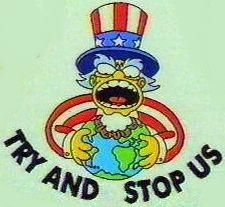
Sunday, July 09, 2006
Monday, July 03, 2006
Politics (like religion) and science do not mix well.
This is a comment on "Al Gore is wrong. There's no "consensus" on global warming."
read it here
"Global Warming" is not a correct description of what is going on, the more accurate descriptive phrase is "climate change."
The Earth's climate is, however, always in a process of change. It has been much colder than it is now, and it has also been much warmer.
The questions to ask are what extent is climate change anthropogenic (man-made), and what --if anything -- should be done about it.
The answer to the first question is "we don't really know."
I always treat with skepticism any report of climate change that fails to acknowledge the Little Ice Age. This was a roughly 400-year-long cycle of temperature decrease that affected the Northern Hemisphere from the 1300s to about 1850.
It is important to note that prior to the Little Ice Age, commercial vinyards operated in Northern England, Greenland was covered in meadows suitable for grazing sheep, and dwarf palm trees could be found in Germany (which had a climate much like Portugal today.)
The Little Ice Age put an end to this, and indeed the Greenland colony was abandoned. Today, there are ruins of farms underneath the ice in Greenland. It may interest some to learn that the Thames river started to freeze over in this period, and New York harbour used to freeze over often in winter -- allowing people to skate from Manhatten to Staten Island. (The last time it did so was 1818).
The Little Ice Age came to an end around 1850, and temperatures began to rise. They still haven't reached the levels they were 800 years ago.
When sheep can graze in Greenland, and commercial wine can be made in England, then temperatures will be back to normal historical levels.
Kyoto was cooked up after the success of the CFC ban in the 1980s. CFCs were dangerous to the ozone layer, and have been effectively elimininated. With CFCs banned, CO2 became the next crusade.
But unlike CFCs, CO2 is a natural component of Earth's atmosphere, and has fluctuated to levels much higher than they are now.
Indeed, in the times of Ancient Greeks, certain warm-climate birds and animals (including lions) had ranges more northerly than they do now.
CO2 is not a poison. It is essential for plantlife.
Rather than spend billions of dollars on Kyoto, I would rather direct resources to containing noxious pollutants (like lead, sulpher dioxide etc) and conserving wildlife habitat.
Pollution that causes smog and poisons water is the important issue, not fluxuations in CO2.
BTW.... What is seldom mentioned in this scaremongering is that water vapour in Earth's atmosphere is responsible for about 90% of the greenhouse effect. CO2 accounts for roughly 5% of the efct, and various other gasses account for the rest.
Humans are responsible for roughly 1% of water vapour emissions (the rest is evaporated off the oceans). CO2 emissions from natural sources (biomass decay, vulcanism etc.) exceed anthropogenic emissions.
In all humans are likely responsible for no more than 2-4% of the greenhouse effect. Meaning, if we shut down everything tomorrow and went back to the Middle Ages, 96-98% of the greenhouse effect would still be occuring.
What we need is scientific evaluation of climate change, not political grandstanding.
read it here
"Global Warming" is not a correct description of what is going on, the more accurate descriptive phrase is "climate change."
The Earth's climate is, however, always in a process of change. It has been much colder than it is now, and it has also been much warmer.
The questions to ask are what extent is climate change anthropogenic (man-made), and what --if anything -- should be done about it.
The answer to the first question is "we don't really know."
I always treat with skepticism any report of climate change that fails to acknowledge the Little Ice Age. This was a roughly 400-year-long cycle of temperature decrease that affected the Northern Hemisphere from the 1300s to about 1850.
It is important to note that prior to the Little Ice Age, commercial vinyards operated in Northern England, Greenland was covered in meadows suitable for grazing sheep, and dwarf palm trees could be found in Germany (which had a climate much like Portugal today.)
The Little Ice Age put an end to this, and indeed the Greenland colony was abandoned. Today, there are ruins of farms underneath the ice in Greenland. It may interest some to learn that the Thames river started to freeze over in this period, and New York harbour used to freeze over often in winter -- allowing people to skate from Manhatten to Staten Island. (The last time it did so was 1818).
The Little Ice Age came to an end around 1850, and temperatures began to rise. They still haven't reached the levels they were 800 years ago.
When sheep can graze in Greenland, and commercial wine can be made in England, then temperatures will be back to normal historical levels.
Kyoto was cooked up after the success of the CFC ban in the 1980s. CFCs were dangerous to the ozone layer, and have been effectively elimininated. With CFCs banned, CO2 became the next crusade.
But unlike CFCs, CO2 is a natural component of Earth's atmosphere, and has fluctuated to levels much higher than they are now.
Indeed, in the times of Ancient Greeks, certain warm-climate birds and animals (including lions) had ranges more northerly than they do now.
CO2 is not a poison. It is essential for plantlife.
Rather than spend billions of dollars on Kyoto, I would rather direct resources to containing noxious pollutants (like lead, sulpher dioxide etc) and conserving wildlife habitat.
Pollution that causes smog and poisons water is the important issue, not fluxuations in CO2.
BTW.... What is seldom mentioned in this scaremongering is that water vapour in Earth's atmosphere is responsible for about 90% of the greenhouse effect. CO2 accounts for roughly 5% of the efct, and various other gasses account for the rest.
Humans are responsible for roughly 1% of water vapour emissions (the rest is evaporated off the oceans). CO2 emissions from natural sources (biomass decay, vulcanism etc.) exceed anthropogenic emissions.
In all humans are likely responsible for no more than 2-4% of the greenhouse effect. Meaning, if we shut down everything tomorrow and went back to the Middle Ages, 96-98% of the greenhouse effect would still be occuring.
What we need is scientific evaluation of climate change, not political grandstanding.






